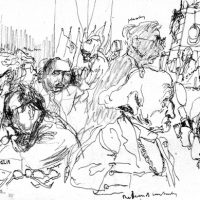-
Red scientist: two strands from a life in three colours
An exploration of Bernal’s contribution to the politicization of science and scientists, above all the development of the Social Relations of Science movement.
-
Writing while socialist
With each workshop the broad outlines of socialist writing become clear to me. I am now able to better distinguish between capitalist writing—which typically emerges from the liberal, mainstream media and is intended to produce commodities—and socialist writing—which is intended to produce a confident community of struggle.
-
How ‘white people’ were invented by a playwright in 1613
The Jacobean playwright Thomas Middleton invented the concept of ‘white people’ on 29 October 1613, the date that his play The Triumphs of Truth was first performed. The phrase was first uttered by the character of an African king who looks out upon an English audience and declares: ‘I see amazement set upon the faces/Of these white people, wond’rings and strange gazes.’
-
Here’s how Breitbart and Milo smuggled nazi and white nationalist ideas into the mainstream
A cache of documents obtained by BuzzFeed News reveals the truth about Steve Bannon’s alt-right “killing machine.”
-
The hackers who made possible a universal electoral register for the Catalan referendum
VilaWeb interviewed one of the IT experts who created, at breakneck speed, the program allowing voters to dodge Spanish repression.
-
Soft shell, hard core: on the 150th anniversary of the publication of Karl Marx’s Capital, Vol. 1
In bourgeois economic theory, competition, commodity production, profit seeking, and growth express something like the human essence. They are ahistorical constants, not the results of specifically capitalist relations that have historically emerged and can therefore be overcome. This is exactly what makes Marx’s critique of economics highly topical.
-
The effect of the whip: The Frankfurt school and the oppression of women
Stuart Jeffries on the Frankfurt School’s absence of women and the points of contact between the thinkers associated with the Institute für Sozialforschung and theorists of feminism.
-
Making ‘Black Lives Matter’ in our schools
How do you kill Mr. Phil and nothing happens?” According to parent Zuki Ellis, this is the question students at J. J. Hill Montessori Magnet School in St. Paul were asking just a few days into summer. On June 16, the Minnesota police officer who fatally shot Philando Castile, or Mr. Phil as students knew him, was acquitted on all charges.
-
The biggest impediment to Saudi women was never the driving ban
No matter their age, Saudi women are treated like minors — to the point that many require permission from their sons to work, study, or travel.
-
Take a knee: The revenge of Colin Kaepernick
After Trump’s deranged demand that ownership purge NFL athletes who fail a loyalty test, it felt a little miraculous when, by a quirk of a game being played in London, Sunday morning dawned on the vision of the Jacksonville Jaguars and Baltimore Ravens arm in arm during the National Anthem. Standing with them was Shahid Khan, the league’s first non-white owner. I’d prefer no owners at all, but for now, it was a vision worth kneeling for.
-
NYT lets think tank funded by Gov’t and arms industry claim huge U.S. military budget isn’t huge enough
The New York Times (9/18/17) gave an enormous platform to a hawkish think tank that is funded by the US government and by top weapons corporations, letting it absurdly claim, without any pushback, that the gargantuan US military—by far the largest in the world—has been “underfunded.”
-
“Capital is not a bible nor a cookbook”, says José Paulo Netto
The work of Karl Marx, Capital, considered “the Bible” of the revolution, was first published 150 years ago. Many political and ideological battles are fought until this day in the name of the German intellectual and his biggest work.
-
No, Antifa is not the moral equivalent of neo-Nazis
Comparisons between citizens fighting against fascism and tiki-torch wielding anti-Semites are absurd – and dangerous.
-
Trouble in the ministry of truth
Apple has touched off a pretty major row in the halls of marketing. Apparently, the next version of its Safari browser will restrict the creation and retention of “cookies,” which are little computer codes that allow big businesses to collect increasingly rich data, without acknowledgement or permission, on internet users.
-
DIY politics in the UK
‘If it ain’t broke, don’t fix it,’ goes the old adage; well it is broke. Over the past two years it has become, for many, overwhelmingly obvious that the mainstream media in the United Kingdom is broke.
-
Understanding the native roots of the constitutions of Bolivia and Ecuador
Good Living is a philosophy promoted by Andean governments of South America, pioneered by Evo Morales (Bolivia) and Rafael Correa (Ecuador). It goes back to the roots of ancestral cultures of the region and posits a model for human life in harmony with nature.
-
In month after Charlottesville, papers spent as much time condemning anti-nazis as nazis
Since the Charlottesville attack a month ago, a review of commentary in the six top broadsheet newspapers—the Wall Street Journal, New York Times, USA Today, LA Times, San Jose Mercury News and Washington Post—found virtually equal amounts of condemnation of fascists and anti-fascist protesters.
-
Not a duel, but a duet
Not even the stubbornest non-voters can ignore the coming Election Day in Germany, as always on a Sunday, September 24. With 34 parties, some state or local but most of them national, every stroll offers a wide choice of handsome, smiling candidate photos and bold clichés.
-
Past continuous: Karl Marx’s Capital can help unravel the perplexities of modern-day capitalism
On September 14, it will be exactly 150 years since the publication of Capital: Critique of Political Economy, the first volume of Karl Marx’s epochal Das Kapital. The historicity of the book can be gauged by the fact that this first of three bulky tomes was published by a Hamburg publisher two years after the American Civil War but well above a decade before the incandescent bulb was invented. Capital however, literally acted as the bulb that shone a light on many a way.
-
Yes, Google uses its power to quash ideas it doesn’t like—I know because it happened to me [updated]
Deliberately manipulating search results to eliminate references to a story that Google doesn’t like would be an extraordinary, almost dystopian abuse of the company’s power over information on the internet.… [But as a now-global monopoly] the company has an incentive to suppress information about itself.







![[Photo: Herbert Marcuse and Angela Davis, 1968]](https://mronline.org/wp-content/uploads/2017/10/NEWmarcuse-angela-davis-1--200x200.jpg)





![Counter demonstrators clash with white supremacist's at the entrance to Emancipation Park in Charlottesville, US [Steve Helber/AP]](https://mronline.org/wp-content/uploads/2017/09/686863bdff84453a976950a37ba56658_18-200x200.jpg)






